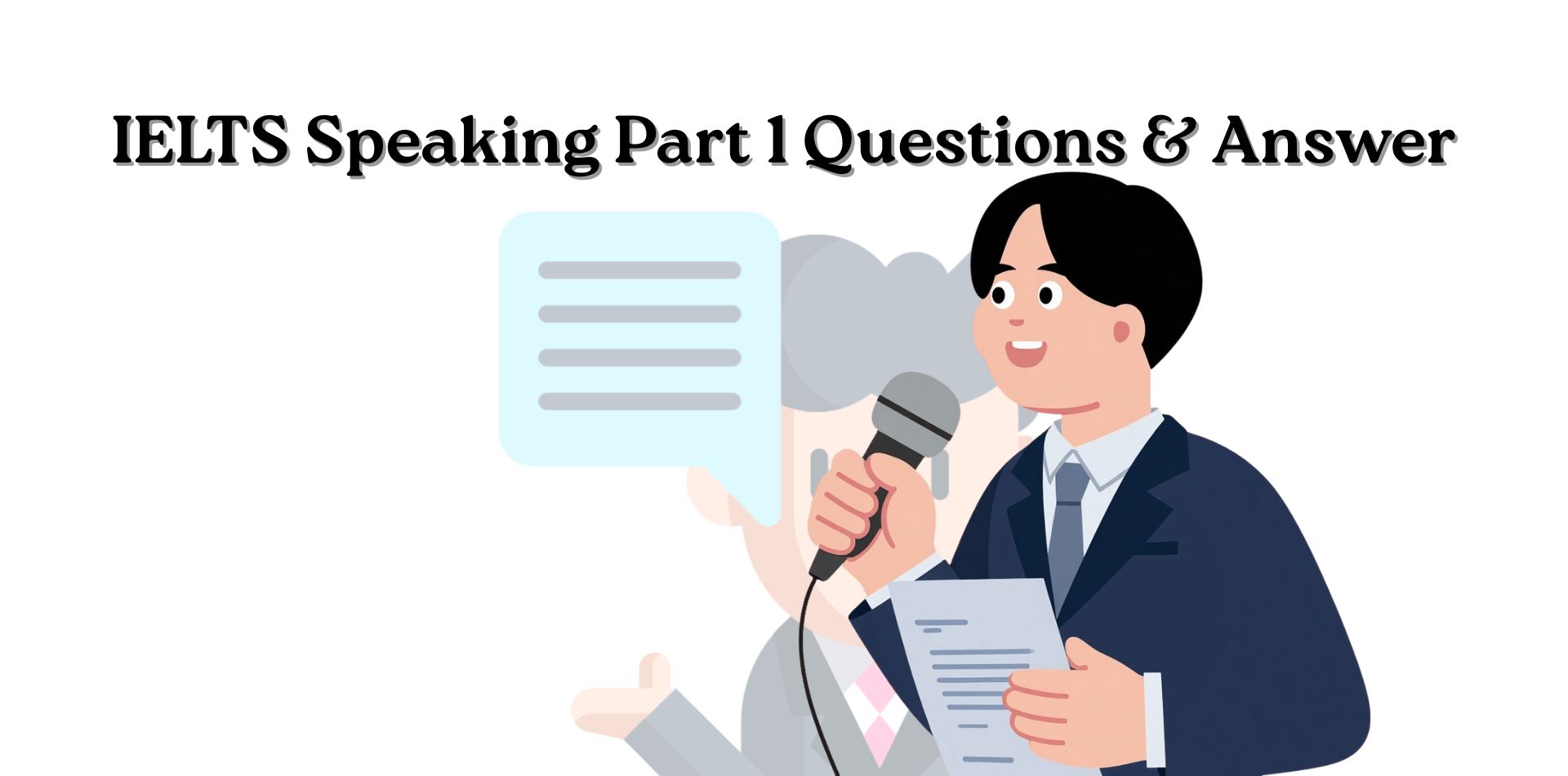The IELTS Speaking Part 1 is the first section of your speaking interview, and it lasts about 4–5 minutes. This part focuses on personal, familiar topics such as your hometown, hobbies, daily routines, studies, work, and preferences. Although the questions seem simple, this section decides how confidently you start the interview—and a strong beginning can positively impact your overall band score.
Table of Contents
This article provides high-quality sample answers, useful tips, common topics, and a complete preparation process to help you achieve Band 7–9 in your IELTS Speaking test.
🔍 What Happens in IELTS Speaking Part 1?
In this section, the examiner will:
- Greet you and check your ID
- Ask questions about you and your life
- Cover 2–3 familiar topics
- Assess your fluency, vocabulary, grammar, and pronunciation
Your answers should be:
- Short but meaningful (2–4 sentences)
- Natural and conversational
- Clear, fluent, and relevant
Part 1 is not about showing deep knowledge. It’s about showing you can talk naturally in English.
🎯 Most Common IELTS Speaking Part 1 Topics
These are the top high-frequency topics:
- Hometown
- Studies
- Work
- Daily routine
- Family
- Hobbies
- Books
- Music
- Travel
- Food
- Technology
- Weather
- Sports
- Friends
- TV and movies
- Shopping
- Health
- Social media
Now let’s look at Band 7–9 level sample answers for these topics.
🗣️ IELTS Speaking Part 1 Sample Questions & Answer
⭐ Topic 1: Hometown
Q1: Where is your hometown?
A: My hometown is a small coastal city in the south of my country. It’s known for its beautiful beaches, friendly people, and relaxed lifestyle. Even though it’s not very modern, it has a warm and peaceful atmosphere.
Q2: What do you like most about your hometown?
A: I love the natural scenery. There are plenty of green hills and clean beaches where people can relax. I also appreciate the slower pace of life, which helps me unwind whenever I’m stressed.
Q3: Has your hometown changed much?
A: Yes, quite a bit. Over the past decade, more shopping centers and cafés have opened, and transportation has improved. However, I think it has managed to keep its original charm.
⭐ Topic 2: Studies / Work
Q1: Are you working or studying?
A: I’m currently a university student studying computer science. I chose this major because I’m fascinated by technology and problem-solving.
Q2: Do you enjoy your studies/work?
A: Yes, absolutely. Although it can be challenging at times, I enjoy learning how software works and building creative solutions. It’s very rewarding.
Q3: What is the most interesting part of your studies/work?
A: For me, the best part is working on projects. I love collaborating with classmates, testing ideas, and seeing something functional come to life.
⭐ Topic 3: Hobbies
Q1: What do you do in your free time?
A: In my free time, I enjoy reading and going for walks. Reading helps me relax, and walking allows me to clear my mind after a long day.
Q2: How often do you engage in your hobby?
A: I try to read for at least 30 minutes every day. Walking, on the other hand, depends on my schedule, but I usually manage to do it three or four times a week.
Q3: Did you have the same hobbies when you were a child?
A: Not really. As a child, I was more interested in outdoor activities like cycling and playing games with my friends. My hobbies have changed as I’ve grown older.
⭐ Topic 4: Travel
Q1: Do you like traveling?
A: Yes, I love traveling. It gives me a chance to explore new cultures, try different foods, and meet people from different backgrounds.
Q2: What was your most memorable trip?
A: My most memorable trip was to Japan. I was amazed by the advanced technology, beautiful temples, and especially the food. It was truly unforgettable.
Q3: Do you prefer traveling alone or with others?
A: I prefer traveling with friends because it’s more fun and cost-effective. However, traveling alone also has its own charm because you can plan everything based on your preferences.
⭐ Topic 5: Food
Q1: What kind of food do you like?
A: I really enjoy Asian cuisine, especially spicy dishes. I also love trying street food because it usually tastes authentic and fresh.
Q2: Do you prefer eating at home or in restaurants?
A: It depends on my mood. Eating at home is healthier and cheaper, but restaurants offer more variety and a relaxing atmosphere.
Q3: Has your taste in food changed over time?
A: Yes, definitely. When I was younger, I didn’t like spicy food, but now I enjoy it a lot. I’ve also become more interested in trying international dishes.
⭐ How to Answer IELTS Speaking Part 1 Like a Band 9 Candidate
To score high in Part 1, follow these principles:
✔ 1. Answer naturally, not like a memorized script
Examiners dislike robotic answers. Speak like you would in a friendly conversation.
✔ 2. Give short but complete answers
Don’t just say “Yes” or “No.” Add a reason or example.
✔ 3. Use a variety of vocabulary
Replace basic words with richer expressions:
- “Very big” → “huge”
- “Very good” → “excellent”
- “I like” → “I’m really into…”
- “I enjoy” → “I find it enjoyable to…”
✔ 4. Show pronunciation features
Use stress, intonation, and pauses naturally.
✔ 5. Don’t worry about difficult grammar
Simple, correct sentences are better than complex mistakes.
📘 How to Prepare for IELTS Speaking Part 1: Step-by-Step Process
Here is a complete, practical preparation guide you can follow to improve your performance.
⭐ Step 1: Understand the Test Format
Before starting, know exactly what to expect:
- 4–5 minutes
- Questions about daily life
- 2–3 topics
- No right or wrong answers
- Assessed on fluency, vocabulary, grammar, pronunciation
When you know the format, you feel more confident.
⭐ Step 2: Build a List of Common Topics
Create a folder with the most common topics:
- Hometown
- Family
- Work
- Study
- Hobbies
- Food
- Daily routine
- Movies
- Travel
- Technology
- Sports
- Social media
Collect 10–15 sample questions per topic.
⭐ Step 3: Write Short Sample Answers for Practice
Don’t memorize long answers—just write 2–4 sentence mini responses.
This improves structure and clarity.
⭐ Step 4: Practice Speaking Daily (5–10 Minutes)
Use a timer and speak out loud:
- Record your voice
- Listen to pronunciation
- Repeat difficult words
You will see progress quickly.
⭐ Step 5: Improve Vocabulary Naturally
Create vocabulary lists for each topic.
Use synonyms, collocations, and descriptive words.
Example (Hometown):
- “located in…”
- “peaceful atmosphere”
- “close-knit community”
- “public transportation”
Learn vocabulary in context, not as isolated words.
⭐ Step 6: Practice Fluency With Real Conversations
Speak with:
- Friends
- Teachers
- Online speaking partners
- AI speaking tools
Fluency improves only through real speaking, not reading.
⭐ Step 7: Work on Grammar Without Overcomplicating
Focus on:
- Present simple
- Present continuous
- Past simple
- Basic complex sentences (because, although, which)
Grammar should sound natural, not forced.
⭐ Step 8: Improve Pronunciation
Practice:
- Pausing naturally
- Speaking clearly
- Using tone, emotion, and intonation
You don’t need a perfect accent—just clarity.
⭐ Step 9: Do Mock Interviews Weekly
Simulate the test:
- Sit in front of your phone
- Set a timer for 4–5 minutes
- Answer questions without stopping
This trains your brain for real exam pressure.
⭐ Step 10: Get Feedback From Experts
If possible, get feedback on:
- Fluency
- Grammar errors
- Pronunciation
- Vocabulary range
A teacher or advanced speaker can help you improve faster.
🎯 Final Tips to Score Band 8 or 9 in Part 1
- Don’t memorize long answers
- Speak naturally and confidently
- Use rich, clear vocabulary
- Add small details to make your answers interesting
- Don’t pause for too long
- Smile and relax
- Think of the examiner as a friend
📝 Conclusion
IELTS Speaking Part 1 is an excellent opportunity to make a strong first impression. With the right preparation, vocabulary, and practice method, you can easily score Band 7–9. Use the sample answers above to build your confidence and follow the preparation steps to improve your fluency and accuracy.

